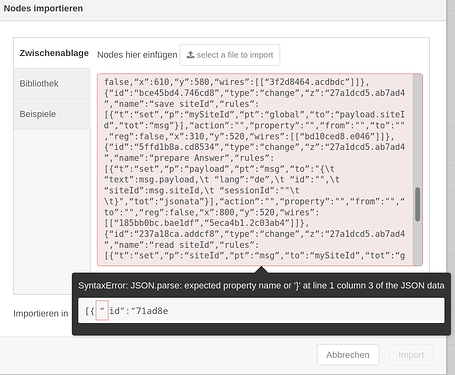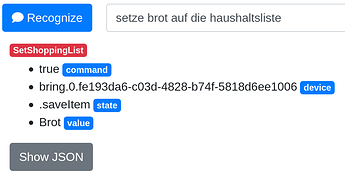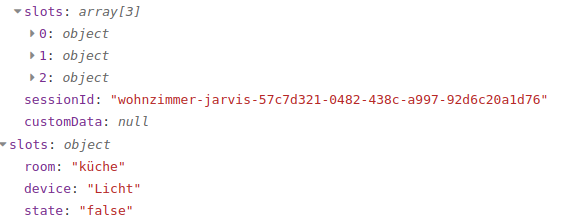Continuing the discussion from Training issue with Rhasspy 2.5: string index out of range:
@kaykoch
Hello Kay,
thank you for these node-red examples. I tried to import them, either directly via copy/past or via .json file. Both ways don’t work due to syntax errors:
From my perspective it’s a mess that I have to create new scripts, just to be able to use Rhasspy 2.5 in the same manner as I used 2.4.x before.
As I already mentioned in my previous post: In 2.4.x there were also these topics available: rhasspy/intent/#, which existed in parallel to hermes/intent/#.
The big advantage of these rhasspy/intents was, that the exactly contained the relevant information of the topic as it is shown under the command line of the Rhasspy home screen:
This allowed for standardised, slim and easy programming of scripts, while the current hermes/intent string appears much more complicated to me:
{“input”: “true Brot auf die bring.0.fe193da6-c03d-4828-b74f-5818d6ee1006 .saveItem”, “intent”: {“intentName”: “SetShoppingList”, “confidenceScore”: 1.0}, “siteId”: “Satellite1”, “id”: “c172d143-da6c-4891-bebc-f3e0342c0c48”, “slots”: [{“entity”: “synonyms_change_command”, “value”: {“kind”: “Unknown”, “value”: “true”}, “slotName”: “command”, “rawValue”: “setze”, “confidence”: 1.0, “range”: {“start”: 0, “end”: 4, “rawStart”: 0, “rawEnd”: 5}}, {“entity”: “shopping_item”, “value”: {“kind”: “Unknown”, “value”: “Brot”}, “slotName”: “value”, “rawValue”: “brot”, “confidence”: 1.0, “range”: {“start”: 5, “end”: 9, “rawStart”: 6, “rawEnd”: 10}}, {“entity”: “device_name_shoppinglist”, “value”: {“kind”: “Unknown”, “value”: “bring.0.fe193da6-c03d-4828-b74f-5818d6ee1006”}, “slotName”: “device”, “rawValue”: “haushaltsliste”, “confidence”: 1.0, “range”: {“start”: 18, “end”: 62, “rawStart”: 19, “rawEnd”: 33}}, {“entity”: “state”, “value”: {“kind”: “Unknown”, “value”: “.saveItem”}, “slotName”: “state”, “rawValue”: “”, “confidence”: 1.0, “range”: {“start”: 63, “end”: 72, “rawStart”: 34, “rawEnd”: 33}}], “sessionId”: “c172d143-da6c-4891-bebc-f3e0342c0c48”, “customData”: null, “asrTokens”: [[{“value”: “true”, “confidence”: 1.0, “rangeStart”: 0, “rangeEnd”: 4, “time”: null}, {“value”: “Brot”, “confidence”: 1.0, “rangeStart”: 5, “rangeEnd”: 9, “time”: null}, {“value”: “auf”, “confidence”: 1.0, “rangeStart”: 10, “rangeEnd”: 13, “time”: null}, {“value”: “die”, “confidence”: 1.0, “rangeStart”: 14, “rangeEnd”: 17, “time”: null}, {“value”: “bring.0.fe193da6-c03d-4828-b74f-5818d6ee1006”, “confidence”: 1.0, “rangeStart”: 18, “rangeEnd”: 62, “time”: null}, {“value”: “.saveItem”, “confidence”: 1.0, “rangeStart”: 63, “rangeEnd”: 72, “time”: null}]], “asrConfidence”: null, “rawInput”: “setze brot auf die haushaltsliste”, “wakewordId”: null}
I understand that Rhasspy 2.5 brings a lot of benefits and advantages. However, by means of smooth and user friendly migration I cannot believe that forcing the users to rewrite all their scripts is the desired migration strategy.
So do you know, if there are currently still some features missing? Will the MQTT data structure remain as it is or will it be extended with rhasspy/intent… as in 2.4.x again?
Kay, maybe you have heard something about this / maybe you are the wrong addressee for these question. So I put @synthesiam in the loop. Please advise me, how to proceed: Re-writing scripts or waiting for rhasspy/intents? Thanks a lot.
Best
Thomas




